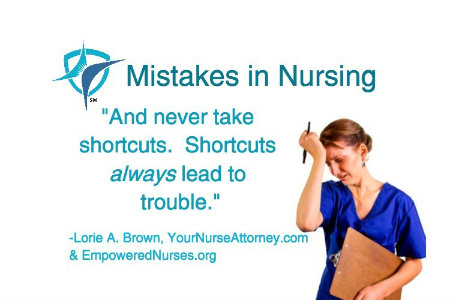Although healthcare is heavily regulated, so are the airline industry and the nuclear power plant industry. However, there doesn’t seem to be the number of mistakes in those latter 2 industries that we, in the nursing field, experience. Although to err is human, what happens when a patient’s life and limb are at stake? I believe the latest studies show that nurses are constantly bombarded with new information at least every 5 minutes.
So, how can we fully improve our practice so that we don’t make a mistake?
One suggestion is to be present in the moment and to be mindful. Now, I am the kind of person who likes to do things when I get them. Otherwise, I may forget.
However, this doesn’t work when I am focusing on something else. Instead, I write it down and return to the task at hand. Unless the new task is an emergency, finish what you have already started and be sure to be focused and to follow through on what you are doing.
And never take shortcuts. Shortcuts always lead to trouble.
When you make a mistake, I know it’s easy to want to cover it up, but that can lead to worse consequences, which could possibly even affect your license. When you do make a mistake and it is a system issue, the system needs to be changed.
Several years ago, there were cases of nurses administering adult dosages of heparin to babies in the NICU because that was what the pharmacy accidentally had placed in the Pyxis. It turned out that the adult and baby vials both looked very similar. That system issue needed to be addressed and it indeed was.
There has to be a way that we can cut down on the number of errors. You know, of course, better staffing is always one suggestion. However, even better staffing does not eliminate errors.
I do believe that nurses have the answers to the problems in healthcare.
What are your solutions to this problem to improve patient care and reduce the number of errors? I would love to hear your thoughts below.









Maura says
Lorie, you are correct – being present in the moment is key to avoiding mistakes. I have found that although it is tempting to go to work when not feeling well, I would tend to make many more mistakes, or NEAR MISSES, when trying to complete complicated nursing tasks while feeling “under-the-weather”.
My rule of thumb now is if I really doubt that I am clear headed enough, because of illness, I do call-in sick. Although I do not like to leave co-workers short staffed, I have come to think of it in two ways…
First- by calling in sick, I present an opportunity for someone who wants to pick up extra hours to do so.
Secondly- if I am not performing at my best, than it is dangerous for my patients and for my license to work.
So, no more guilt! When I am sick, I do not work!
Maura RN
tracy says
What constitutes a error? This seems to vary alot among different places I have worked. There is a difference between not signing out a med and fatally overdosing a patient.
Susan V Haibeck says
Let’s have a nurse and co-nurse for every patient.
Laurie B says
I like the idea that I recently stumble upon of the “Just Culture” approach to healthcare.
I’ve seen evidence that a less punitive and more supportive culture can and does reduce medical error
LORIE A BROWN, R.N., M.N., J.D. says
Hi Laurie, thanks for the comment. I have heard of Just Culture and will research and write about it.
LORIE A BROWN, R.N., M.N., J.D. says
Hi Tracy thanks for your comment.